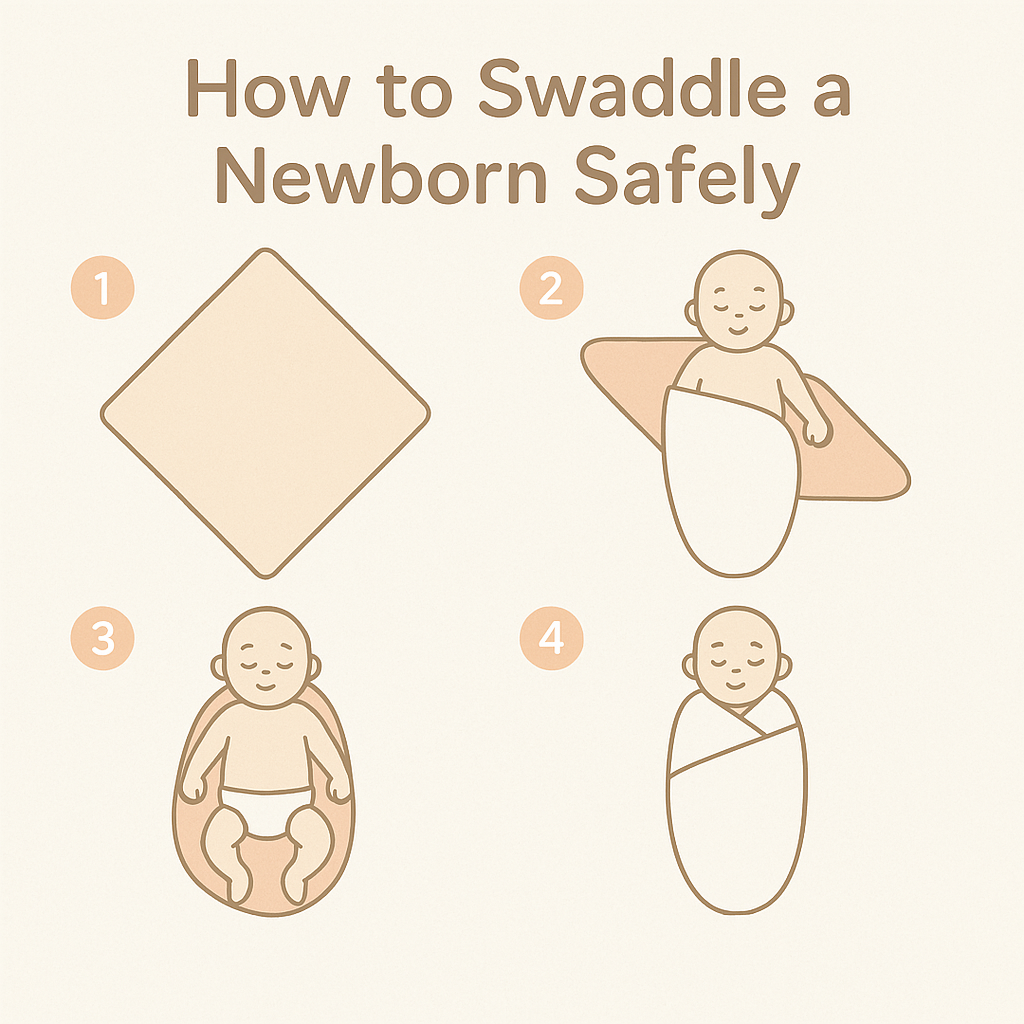Table of Contents
Every new parent dreams of a full night’s sleep, but newborns have their own unpredictable rhythms. The good news? You can gently guide your baby toward a healthier sleep routine—without stress or sleepless nights!
In this comprehensive 2,500-word guide, we’ll break down 7 proven steps to create a newborn sleep schedule that works, answer the most-searched questions, and help you establish a peaceful routine for your little one (and yourself!).

Why a Newborn Sleep Schedule Matters
Newborns sleep 16-18 hours a day, but in short bursts. Without a loose structure, exhaustion can hit parents hard. A flexible yet consistent sleep schedule helps:
✔️ Regulate baby’s circadian rhythm – Newborns don’t produce melatonin efficiently, so they need external cues to distinguish day from night.
✔️ Reduce overtiredness – Paradoxically, the more exhausted a baby is, the harder it is for them to fall and stay asleep.
✔️ Improve feeding patterns – A well-rested baby feeds better, leading to healthier weight gain.
✔️ Give parents much-needed rest – Predictable sleep windows mean you can plan your own rest.
Expert Insight:
“While newborns can’t follow strict schedules, introducing gentle routines early helps them transition into longer sleep stretches by 3-4 months.” – Dr. Sarah Mitchell, Pediatric Sleep Consultant
Step 1: Understand Newborn Sleep Cycles (How Long Should a Newborn Sleep?)
Newborns don’t follow adult sleep patterns. Instead, they cycle through light sleep, deep sleep, and REM sleep every 50-60 minutes.
Newborn Sleep by Age:
🔹 0-6 Weeks:
- Sleep in 2-4 hour stretches
- Wake frequently for feeds (every 2-3 hours)
- Total sleep: 16-18 hours/day
🔹 6-12 Weeks:
- Begin longer nighttime stretches (4-6 hours)
- More alert during the day
- Total sleep: 14-16 hours/day
Pro Tip: Watch for sleep cues (yawning, rubbing eyes, fussiness) to avoid overtiredness. Missing these signs can lead to a “second wind,” making it harder for your baby to settle.
Step 2: Set a Flexible Feeding Schedule (How Often Should a Newborn Eat at Night?)
Hunger is the #1 reason newborns wake. Most babies need 8-12 feedings per day (every 2-3 hours).
Breastfed vs. Formula-Fed Babies:
| Breastfed Babies | Formula-Fed Babies |
|---|---|
| Digest milk faster (every 1.5-3 hours) | Digest slower (every 2.5-4 hours) |
| May cluster feed in evenings | More predictable schedule |
| Night feeds crucial for milk supply | Can sometimes sleep longer stretches |
Nighttime Rule:
- First 2 weeks: Wake baby if they sleep past 4 hours to ensure proper growth.
- After 2 weeks: If baby is gaining weight well, let them sleep longer at night.
Common Mistake: Skipping nighttime feeds to “encourage sleep” can lead to dehydration or slow weight gain.
Step 3: Create a Day-Night Difference (How Do I Teach My Newborn Day vs. Night?)
Newborns are born without a circadian rhythm. Help them adjust with these strategies:
☀️ Daytime Routine:
- Bright light exposure – Open curtains, go outside.
- Active engagement – Play, talk, sing.
- Limit naps – Cap at 2 hours to prevent day/night confusion.
🌙 Nighttime Routine:
- Dim lights – Use soft, warm lighting.
- Minimal interaction – Keep feeds and diaper changes quiet.
- White noise – Helps mask household sounds.
Science-Backed Tip:
Exposing your baby to natural sunlight in the morning helps regulate melatonin production, improving nighttime sleep.
Step 4: Establish a Soothing Bedtime Routine (What’s the Best Bedtime Routine for a Newborn?)
A calm, predictable routine signals sleep time. Here’s a step-by-step guide:
- Warm bath – Relaxes muscles and lowers cortisol.
- Gentle massage – Use baby-safe oil for comfort.
- Soft lullabies or white noise – Creates a sleep association.
- Swaddle snugly – Prevents startle reflex wake-ups.
- Feed until drowsy (but put down awake) – Helps baby learn to self-soothe.
Ideal Bedtime:
- Newborns (0-8 weeks): 8-10 PM (follow their natural rhythm)
- 8+ weeks: Gradually move toward 7-8 PM for longer nighttime sleep.
Step 5: Master the Art of Swaddling (Does Swaddling Really Help Newborns Sleep?)

Swaddling mimics the womb, reducing the Moro (startle) reflex that wakes babies.
Swaddling Do’s & Don’ts:
✅ Do:
- Use a lightweight, breathable blanket.
- Keep hips loose to prevent dysplasia.
- Stop when baby shows signs of rolling (around 2-4 months).
❌ Don’t:
- Over-swaddle (check for overheating).
- Use loose blankets (SIDS risk).
Alternative: Transition to a sleep sack when swaddling is no longer safe.
Step 6: Optimize the Sleep Environment (Where Should My Newborn Sleep Safely?)
The ABCs of Safe Sleep (per AAP guidelines):
- Alone (no co-sleeping)
- Back (always place baby on back)
- Crib (firm mattress, no loose bedding)
Ideal Sleep Setup:
🌡️ Temperature: 68-72°F (use a room thermometer)
🔇 Sound: White noise (45-50 decibels)
💡 Lighting: Pitch black or very dim red light
Common Mistake: Overheating—dress baby in one more layer than you’d wear.
Step 7: Track & Adjust (How Long Does It Take for a Newborn to Adjust to a Schedule?)
Babies change rapidly! Use a sleep log to track:
- Nap times & durations
- Night wakings
- Feeding patterns
When to Expect Changes:
🔹 0-6 weeks: Highly variable, focus on survival!
🔹 6-12 weeks: Longer nighttime stretches emerge.
🔹 3-4 months: More predictable naps (3-4 per day).
Pro Tip: Apps like Huckleberry or Baby Tracker can help spot patterns.
Final Thoughts: Patience Wins the Sleep Battle!
Creating a newborn sleep schedule isn’t about strict rules—it’s about gentle guidance. Some days will be perfect; others, chaotic. And that’s okay!
By following these 7 genius steps, you’ll help your baby (and yourself) sleep better, leading to happier, healthier days ahead.
💤 Sweet dreams, super parent!
FAQs
1. Should I Wake My Newborn to Feed?
First 2 weeks: Yes, every 3 hours (unless doctor advises otherwise).
After 2 weeks: If baby is gaining weight well, let them sleep longer at night.
2. Why Does My Newborn Only Sleep in My Arms?
Reason: They love your warmth, heartbeat, and scent.
Solution: Gradually transition by:
Warming the bassinet with a heating pad (remove before placing baby down).
Using your scent (wear their sheet for an hour before bedtime).
3. How Can I Get My Newborn to Sleep Longer at Night?
Cluster feed before bedtime.
Dream feed (around 10-11 PM).
Avoid overstimulation during night wakings.
4. Is It Normal for Newborns to Grunt and Twitch in Sleep?
Yes! Active sleep is normal (they spend 50% in REM).
Only worry if baby seems in distress or stops breathing.
Read more
10 Essential Parenting Hacks for Busy Moms and Dads
7 Positive Discipline Strategies for Toddlers That Actually Work